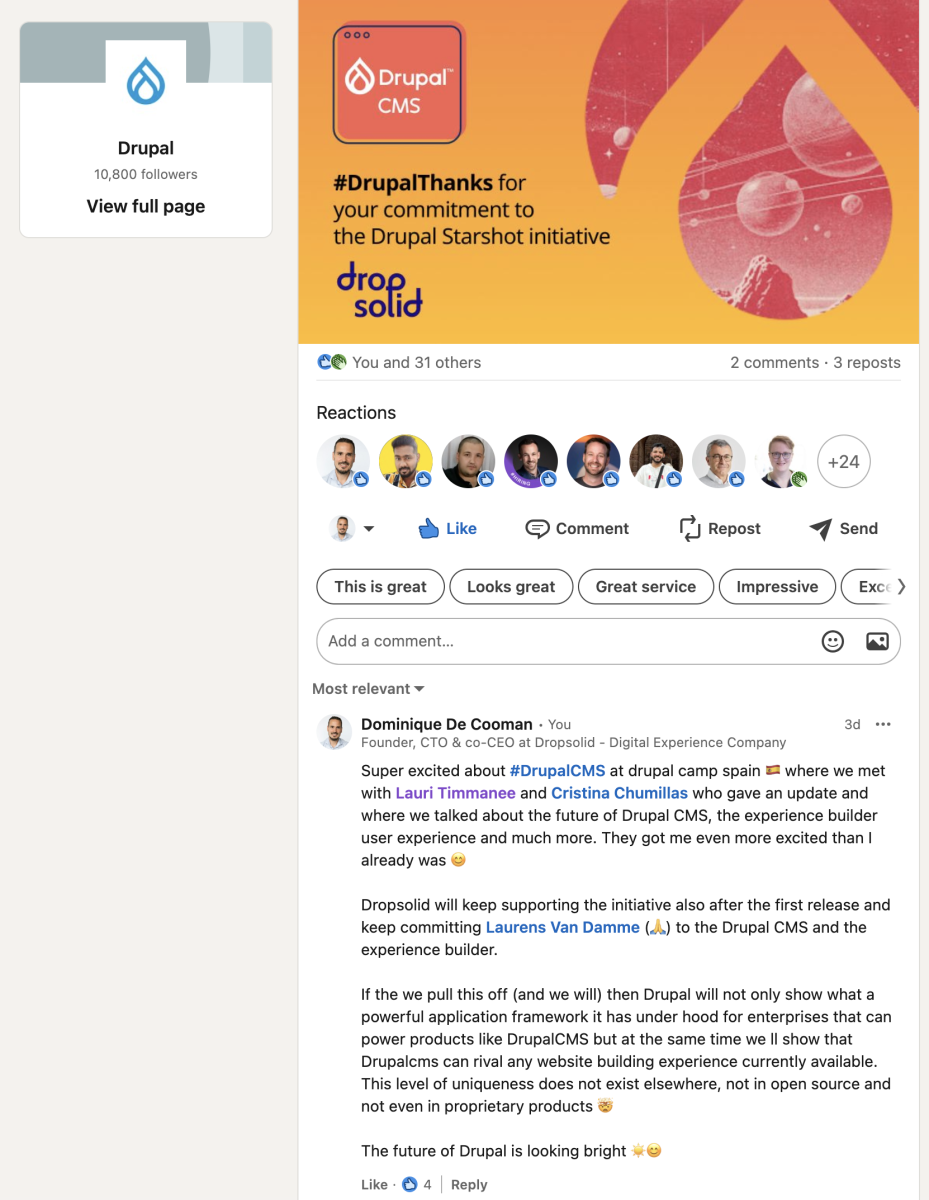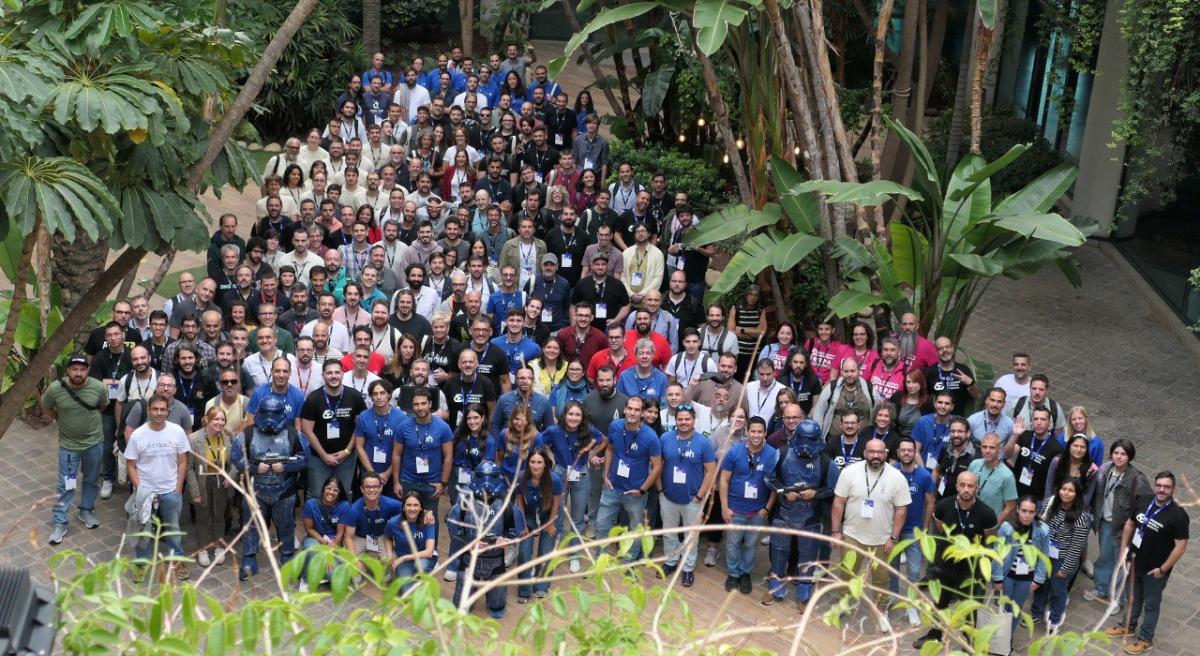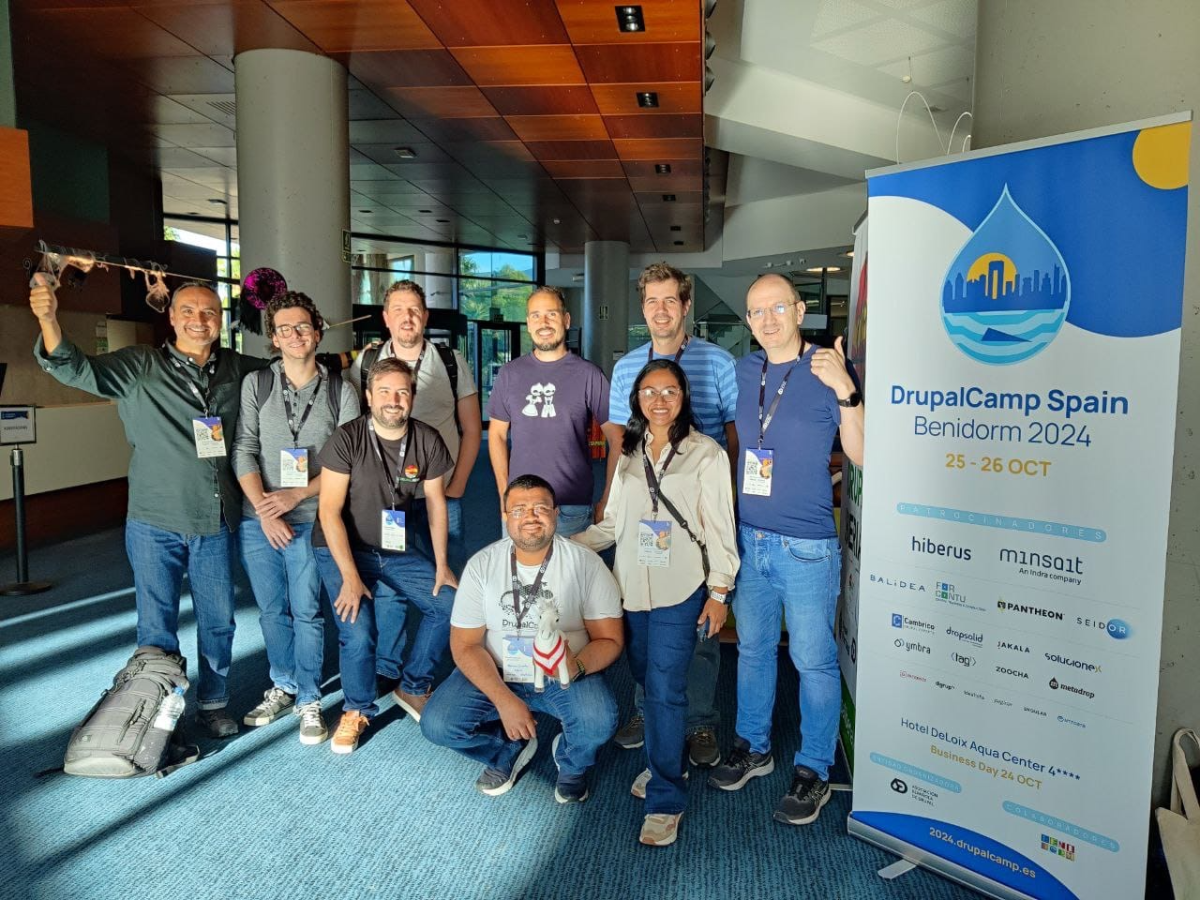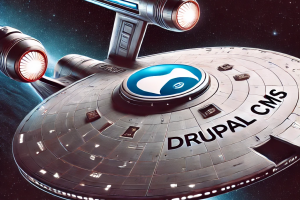Drupal and the USS enterprise
At Drupalcamp Spain I had this moment of inspiration where I saw a further comparison between Drupal and the USS Enterprise from Star Trek.
Enjoy this creative exercise :)
In the expansive universe of technology, it’s easy to think of platforms as tools with specific uses. But when we look at something as versatile and adventurous as Drupal, we see parallels with another iconic starship: the USS Enterprise. The Enterprise wasn’t just a spaceship—it was an adaptable vessel built for exploration, capable of separating its core components to serve its mission flexibly and powerfully. Similarly, Drupal is pioneering new possibilities in content management, and with the new Starshot project (separating its core from the CMS), Drupal is exploring its own final frontier.
1. Separation of Saucer and Core: Flexibility in Product and Core
The USS Enterprise’s ability to separate its saucer section from its core enabled it to adapt to mission-specific needs. In times of conflict, it allowed the core—housing the warp drive and key weapons systems—to focus solely on the objective, while the saucer section protected its crew and other non-combat personnel.
Likewise, with the Starshot initiative, Drupal is separating its core from the CMS. This approach isn’t just for modularity; it’s about freedom and flexibility. By decoupling the core from the CMS, Drupal can operate in a “framework-product” capacity, supporting different types of applications to suit varied needs. Just as the Enterprise’s saucer-core separation makes it a formidable weapon when needed, Drupal’s separation lets it scale and adapt to almost any content-related mission, from simple website setups to complex digital experience platforms (DXPs).
We are showing the world how our framework can power a CMS that is not only more user friendly but also richer in capabilities than any other open source CMS and even proprietary platform out there.
I already share this linkedin comment about it and I think it's true, next to the immediate value of Drupal CMS the long term value of the core / product seperation will be even greater.

https://www.linkedin.com/feed/update/urn:li:activity:7255931325046566912/
2. Boldly Going Where No CMS Has Gone Before
The Enterprise isn’t just a military vessel; it’s a ship of exploration. Its crew isn’t out just to engage with other civilizations; they’re seeking knowledge, forging relationships, and pushing the boundaries of what’s possible. Similarly, Drupal isn’t just a CMS for just corporate profits—it’s a platform for innovation and discovery. Through open-source collaboration, Drupal has consistently pushed the boundaries of what a CMS can do, from multilingual capabilities to intricate content personalization and seamless integrations with emerging technologies like AI.
Drupal's commitment to innovation echoes Starfleet's Prime Directive: prioritizing growth, ethical exploration, and shared knowledge. Like Starfleet, the Drupal community is open to all who wish to learn and contribute, creating an ecosystem that evolves and innovates together.
I also hope to see the CMS go bodly towards the boundaries and into new DXP territory.
3. Community and Crew: The Power of Open Collaboration
The USS Enterprise is not just a ship; it’s a crew bound by shared goals and a diversity of expertise. From the captain to engineers, medical staff, and science officers, each member brings unique knowledge and skills, combining strengths to overcome obstacles. In a similar way, Drupal’s strength lies in its community. A network of developers, designers, strategists, and businesses from around the world unite to improve Drupal, contributing to its codebase, sharing solutions, and iterating on its vast array of modules and capabilities.
Just as the Enterprise’s crew faced challenges together, from alien encounters to uncharted territories, the Drupal community addresses ever-evolving needs—security, scalability, adaptability, and accessibility. This spirit of collaboration keeps the platform resilient and adaptive, enabling it to serve a wide range of use cases with grace and reliability.
At Drupalcamp Spain you could feel the strength of the community.
Everyone:

The Portuguese delegation:

The camp report: https://dropsolid.com/en/knowledge-hub/drupalcamp-spain-drupal-cms-excit...
4. Mission-Critical Resilience: Shields Up!
The Enterprise is a battle-tested starship that can withstand formidable foes and interstellar threats. In the digital world, resilience is vital, and Drupal has a proven track record of robust security and stability. Just as the Enterprise relies on shields, Drupal has a rigorous security process managed by an active security team. Its open-source nature allows continuous auditing and patching, which fortifies Drupal against emerging threats. So whether it's a high-traffic day or a sudden need for scalability, Drupal has the “shields” to protect and perform under pressure.
Even Drupal is protected better from treaths from within. See what is happening in the Wordpress community with Matt. Will Wordpress stay open source, of kind of? Luckly thanks to our visionary leader Dries the community and business ecosytem is structured like this that no single entity can claim rights to Drupal. Made me also reflect on how lucky we are with Dries.
Conclusion: The Ongoing Voyage
Drupal’s evolution mirrors the USS Enterprise’s ongoing journey: both are built on the ideals of exploration, community, and a mission that goes beyond profit. By embracing the concept of a product / core separation and continually pushing the boundaries of digital experience, Drupal is empowering organizations to boldly go beyond the traditional limitations of content management.
Just as the USS Enterprise continues its mission through every iteration, so does Drupal. Its Starshot initiative will enable even greater flexibility and adaptability, creating new frontiers for businesses, nonprofits, governments, and creators everywhere. To those in the Drupal community and beyond: here's to exploring new possibilities, with Drupal as our starship, and innovation as our final frontier.
We are boldly going where no one went before in open source :)


Add new comment